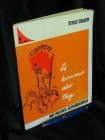Es steht ein goldnes Garbenfeld,
das geht bis an den Rand der Welt.
Mahle, Mühle, mahle !
Es stockt der Wind im weiten Land,
viel Mühlen stehn am Himmelsrand,
Mahle, Mühle, mahle !
Es kommt ein dukles Abendrot,
viel arme Leute schrein nach Brot.
Mahle, Mühle, mahle!
Es hält die Nacht den Sturm im Schoß,
und morgen geht die Arbeit los.
Mahle, Mühle, mahle !
Es fegt der Sturm die Felder rein,
es wird kein Mensch mehr Hunger schrein.
Mahle, Mühle, mahle !
das geht bis an den Rand der Welt.
Mahle, Mühle, mahle !
Es stockt der Wind im weiten Land,
viel Mühlen stehn am Himmelsrand,
Mahle, Mühle, mahle !
Es kommt ein dukles Abendrot,
viel arme Leute schrein nach Brot.
Mahle, Mühle, mahle!
Es hält die Nacht den Sturm im Schoß,
und morgen geht die Arbeit los.
Mahle, Mühle, mahle !
Es fegt der Sturm die Felder rein,
es wird kein Mensch mehr Hunger schrein.
Mahle, Mühle, mahle !
envoyé par Bernart Bartleby - 21/4/2014 - 14:26
Langue: anglais
Traduzione inglese da PoetryExplorer
HARVEST SONG
A field of golden wheat there grows,
Even to the world's end it goes.
Grind, O mill, keep grinding!
The wind falters in all the land,
The mills on the horizon stand.
Grind, O mill, keep grinding!
The evening sky turns somber red;
Many poor people cry for bread.
Grind, O mill, keep grinding!
The night's womb holds a storm within;
To-morrow shall the task begin.
Grind, O mill, keep grinding!
The storm shall sweep the fields of earth
Until no man cries out for dearth!
Grind, O mill, keep grinding!
A field of golden wheat there grows,
Even to the world's end it goes.
Grind, O mill, keep grinding!
The wind falters in all the land,
The mills on the horizon stand.
Grind, O mill, keep grinding!
The evening sky turns somber red;
Many poor people cry for bread.
Grind, O mill, keep grinding!
The night's womb holds a storm within;
To-morrow shall the task begin.
Grind, O mill, keep grinding!
The storm shall sweep the fields of earth
Until no man cries out for dearth!
Grind, O mill, keep grinding!
envoyé par Bernart Bartleby - 21/4/2014 - 14:26
Langue: finnois
Traduzione finlandese / Finnish translation / Traduction finnoise / Finnische Übersetzung / Suomennos: Juha Rämö
SADONKORJUULAULU
Viljapelto kultainen mun eessäin avautuu
ja kauas maailman rantaan asti ulottuu.
Jauha, mylly, jauha!
On asettunut tuuli mailla alavilla,
ja myllyt kohoavat taivaan rantamilla.
Jauha, mylly, jauha!
Jo illan tumma rusko maan ylle laskeutuu,
ja leipäpalaa syödäkseen anoo köyhän suu.
Jauha, mylly, jauha!
Yön syli vain jos myrskyn pitää kahleissaan,
niin aamun koittaessa taas työtä jatketaan.
Jauha, mylly, jauha!
Niin kauan pyyhkiköön myrskytuuli yli maan,
kunnes köyhäkin voi saada leivän pellostaan.
Jauha, mylly, jauha!
Viljapelto kultainen mun eessäin avautuu
ja kauas maailman rantaan asti ulottuu.
Jauha, mylly, jauha!
On asettunut tuuli mailla alavilla,
ja myllyt kohoavat taivaan rantamilla.
Jauha, mylly, jauha!
Jo illan tumma rusko maan ylle laskeutuu,
ja leipäpalaa syödäkseen anoo köyhän suu.
Jauha, mylly, jauha!
Yön syli vain jos myrskyn pitää kahleissaan,
niin aamun koittaessa taas työtä jatketaan.
Jauha, mylly, jauha!
Niin kauan pyyhkiköön myrskytuuli yli maan,
kunnes köyhäkin voi saada leivän pellostaan.
Jauha, mylly, jauha!
envoyé par Juha Rämö - 9/1/2019 - 13:20
×
![]()







Versi di Richard Dehmel (1863-1920), poeta e scrittore tedesco, cantore dei diritti dei lavoratori (ma poi anche entusiasta volontario nella prima guerra mondiale. Morì nel 1920 in seguito alle ferite riportate in battaglia). Nella raccolta intitolata “Aber die Liebe” pubblicata nel 1893.
Musica di Béla Reinitz (1878-1943), compositore ungherese, nella sua opera “Es wird gehn (Ça ira...) - 8 Lieder” per voce e pianoforte, con brani di Richard Dehmel, Erich Mühsam (Lumpenlied, Der Revoluzzer), Josef Luitpold (Krieg, Trotziger Abschied), Georg Herwegh e Klabund.